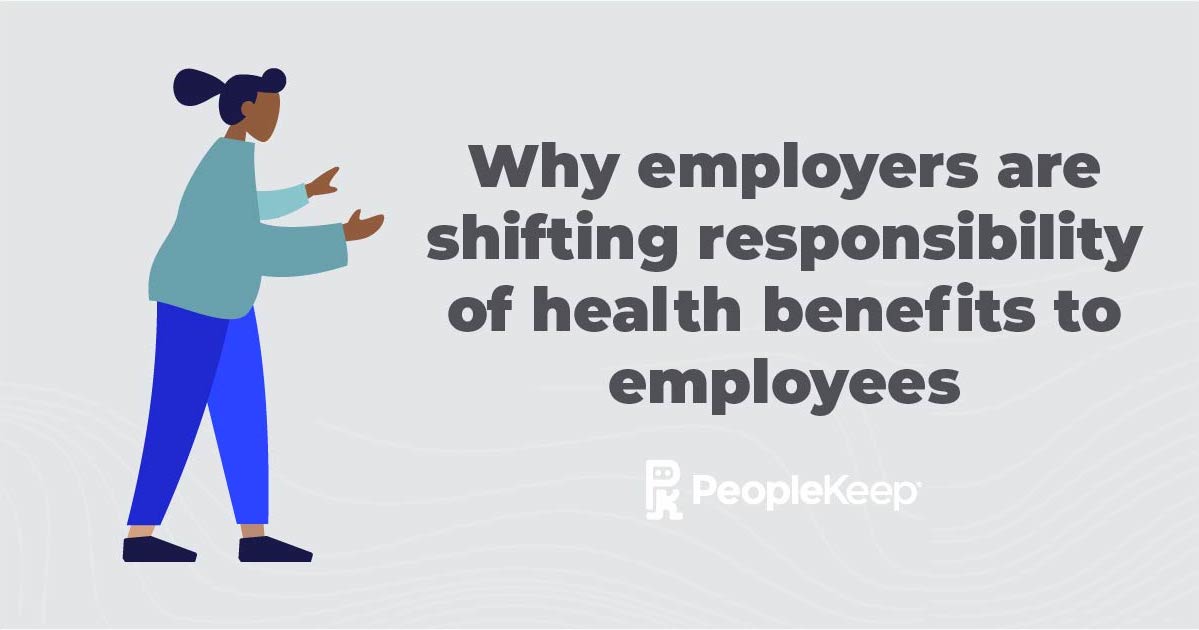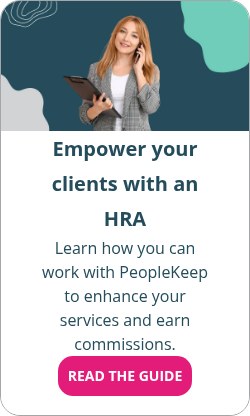Selling health insurance to SMBs: Tips for brokers
By Holly Bengfort on February 27, 2024 at 6:11 AM
Small and medium-sized businesses (SMBs) are the true driving force behind the United States economy. The Small Business Administration1 (SBA) reports more than 33 million SMBs exist in the U.S., which account for 99.9% of all businesses. Despite their enormous share, SMBs have been a difficult market for health insurance professionals to sell to. That's because many SMBs can't afford traditional group health insurance.However, new solutions such as health reimbursement arrangements (HRAs) are opening the SMB market back up to those in the health insurance business and creating significant opportunities for growth.
In this article, we'll explore essential tips and powerful strategies that can help brokers effectively sell health insurance plans to SMBs.
Takeaways from this blog post:
- Health insurance brokers should shift from being salespeople to consultants, providing valuable educational resources for small and medium-sized business owners (SMBs).
- SMBs have unique challenges, such as budget constraints and difficulty meeting group health insurance participation requirements, so brokers should offer more flexible health benefits solutions like HRAs and health stipends.
- It's important for brokers to guide SMBs through the buying process and share successful solutions that have worked for other businesses to establish credibility.
How do brokers get licensed to sell health insurance?
Health insurance agents and brokers play a crucial role in educating SMBs about their health insurance coverage options. But the first step in becoming an effective broker for SMB clients is to get your professional insurance license.
According to each state's guidelines, brokers must complete a specific pre-license education course and take a licensing exam to earn an official insurance license. Once a broker completes the required coursework, they're eligible to take the state's agent or broker licensure exam.
Licensing exams vary by state, but they all test for knowledge of health insurance regulations at the federal government level and state insurance regulations.
Other aspects of the exams usually include:
- Rules on selling health insurance
- How insurance claims are handled
- Health insurance terminology
- Restrictions that could apply to selling health insurance
How do brokers sell health insurance to clients?
Once a broker has a professional license, they're ready to sell health insurance to SMBs. While health insurance agents must contract with an individual insurance company to sell their products, brokers assist their clients by helping them find the policy that best fits their needs, no matter the insurer.
Brokers shouldn’t favor a particular insurance company or plan. Instead, they need to understand their client’s specific needs.
Licensed agents and brokers are experts in helping their clients select the right types of insurance products. SMB clients expect their brokers to have valuable insights into the insurance industry. They want them to be a source of health insurance and consumer protection information and to keep them informed of any updates and changes to their coverage throughout the plan year.
Therefore, it's essential to keep your client and their employees in mind when recommending a particular health insurance policy.
Seven tips for selling health insurance to SMB clients
Most health insurance brokers spend many hours building their insurance book of business and understanding the various plans available. Whether you've been selling insurance for years or recently started your brokerage, having an effective market strategy for SMB clients is crucial.
Below are seven methods to attract potential clients and generate SMB insurance leads.
1. Shift from consultant to educator
When talking with owners of small and midsize businesses, it's important to remember that many of them are offering health benefits for the first time. They'll look to you as a valuable educational resource, not just as a salesperson. You should become their go-to person for changes in health reform, reporting, compliance, and other best practices.
Take the time to meet with potential clients, listen to their concerns, and provide personalized advice. You’ll also need to educate them on health benefits and terms. This will not only help establish your credibility but also strengthen your chances of building lasting relationships.
By shifting from a consultant or salesperson to an educator, you'll become a trustworthy source to fill their gaps in knowledge, making them far more likely to trust you to find them the right health benefits solution when they're ready to enroll.
2. Understand the SMB's unique challenges
Next, it's important to remember that SMBs come with unique pain points that larger organizations don't have to worry about. The most obvious is their budget.
While larger organizations are starting to realize the cost of healthcare is becoming unsustainable, the annual rate hikes and increasing premium prices that come with traditional group health insurance are even more of a concern for SMBs with smaller budgets to dedicate to their employees' healthcare.
With fewer employees, SMBs also have a much harder time meeting a group health insurance policy's minimum participation requirements. Whether they have many employees still on their parents' insurance, older employees who qualify for Medicare, or others who simply don't want to participate in a group health plan, SMBs need a more flexible health benefits solution.
Rather than pushing a group health plan, reimbursement models like HRAs and health stipends serve as more cost-controlled and flexible health benefits that work for employees from various health situations and insurance statuses.
3. Guide the SMB through the buying process
With fewer tiers in the organization's hierarchy and fewer people involved in the decision-making process, SMBs generally churn through the buying process much faster than larger employers. It's your job to make sure you're facilitating this process so they don't get stuck in the funnel.
From the beginning, you should ensure you're talking with the right people by asking the following questions:
- Who is involved in the decision? What are their steps to make a decision?
- Who are the most influential decision-makers? When will they get involved?
- What does each decision-maker want? What are their problems/needs?
- How does each decision-maker feel about health benefits, and what priority do they place on finding a solution?
Once you have answers to these questions, you can match the steps of your sales process to where they're at in the decision-making process.
4. Share solutions you've found for other SMBs
The majority of buyers heavily rely on the opinions of their peers when making decisions. With that in mind, health insurance professionals should provide as much data and case studies as possible to help their prospects find relatable experiences.
Showcasing the solutions that worked for other SMBs helps your current prospect find a solution faster and establishes your credibility working with small and midsize businesses.
PeopleKeep has a collection of case studies showcasing the success of SMBs using HRAs.
One way SMBs are the same as your other clients is they value openness and honesty, especially from licensed professionals. Because many SMBs are new to health benefits, they'll need your honest opinion and insight on what's right for them.
It's also important to note that some SMBs may go into the buying process thinking they'll find a traditional group health insurance plan—after all, it's what most employees expect.
However, you may need to steer them to a health benefits solution that's more realistic for their budget but still meets their employees' healthcare needs.
5. Reach out in a variety of ways
Unlike large employers with teams of people, oftentimes, business owners of small and midsize businesses are doing the jobs of many, making it easy for them to get distracted with a dozen other tasks.
That's why it's important to follow up with new information to keep them engaged. Early on, you should make contact in various ways, including phone calls, emails, text messages, and in-person meetings. You'll soon get a sense of which form of communication your prospect responds to best, and you can tailor how you get in touch with them in the future.
6. Provide ongoing support
Your role as a broker doesn't end when the insurance plan is signed. SMBs often need continuous support, especially during employee onboarding, claims filing, and plan renewals. Make yourself available to answer any questions, troubleshoot any issues that arise, and provide support throughout the policy period. Excellent customer service will go a long way in building a loyal customer base.
7. Stay connected with old leads
Finally, don't forget to reconnect with your old leads every so often to check in with them. A great time to do this is when new developments in health reform may change things for your previously closed prospects.
As new policies and rules emerge in the healthcare space, your prospect's options for health benefits may open up. Additionally, you may see changes in your prospect's budget. After all, it never hurts to reconnect and see how they're feeling.
How HRAs can help you solve your clients’ health benefits hurdles
If you have clients who can’t afford a traditional group health insurance plan, don’t meet the minimum participation requirements, or experience a steep rate increase, tell them about HRAs. With stand-alone HRAs like the qualified small employer HRA (QSEHRA) or individual coverage HRA (ICHRA), your clients can reimburse their employees with a monthly allowance of tax-free money for qualifying medical expenses and individual health insurance premiums.
This can benefit you in multiple ways. First, an HRA gives your clients an affordable benefits solution, making you a hero. When you refer clients to PeopleKeep, and they sign up with us to administer their HRAs, we compensate you! Second, since your clients’ employees will need to find individual health insurance coverage, we’ll send their employees back to you for help enrolling in an individual plan, further contributing to your book of business.
Learn more about how HRAs can benefit your business.
Conclusion
While many SMBs think they can't afford health insurance, a good insurance broker knows which health benefits solutions to offer that will address every SMB's pain points, including cost, time management, and employee retention. By following the tips in this article, you'll be ready to talk to SMBs about how they can make health benefits work for their employees.
Interested in learning more about HRAs? Schedule a call with a personalized benefits advisor now!
This article was originally published on September 9, 2013. It was last updated on February 27, 2024.
Check out more resources
See these related articles

Your Small Tech Company Can Still Offer Healthcare
Finding affordable healthcare benefits may not be a top priority for small technology companies, SaaS companies, and tech startups.

Why employers are shifting the responsibility of health benefits to employees
Employers today are giving their employees more control over their own healthcare experience. See how it's a win-win for both organizations and employees.

Health insurance options for the self-employed
This article breaks down the various health insurance plans and options for the self-employed so you can make the best decision for your health and finances.



